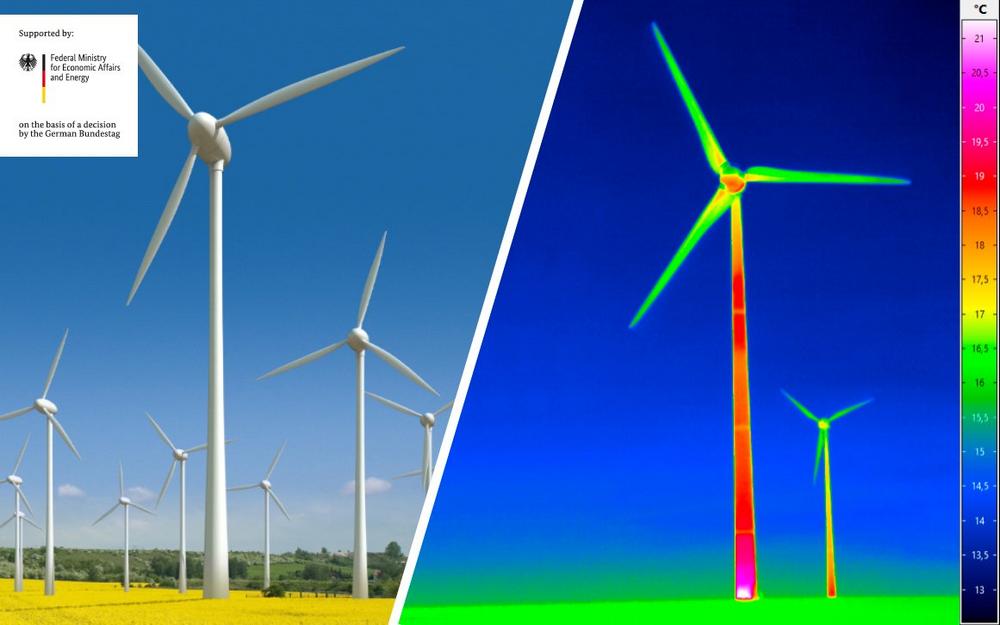The rotor blades are subject to very high stresses during years of permanent operation and are exposed to weather conditions, lightning strikes and, in the case of offshore installations, salt water. Caused by these factors or hidden production faults, cracks, erosion damage or internal structural changes to the rotor blades can lead to the failure of the wind turbine and, in the worst case, to personal injury. For this reason, the rotor blades must be regularly inspected and maintained.
Development of an efficient procedure for damage detection
One already established non-destructive testing method is heat flow or active thermography, which was introduced by the Fraunhofer Institute for Wood Research Wilhelm-Klauditz-Institut (WKI) and which detects the change in surface temperature distribution after thermal excitation of the test part. The Bundesanstalt für Materialforschung und -Prüfung (BAM) [Federal Institute for Materials Research and Testing] has currently adapted the method of passive thermography in order to make the inspection and maintenance of wind turbines safer and more cost-effective for all involved. With this method, thermal excitation is not to be "actively" provided by external sources, but instead solar radiation, wind or the natural temperature curve throughout the day are to be "passively" used.
Using a drone-compatible infrared camera with a cooled detector and correspondingly high thermal resolution to be developed in the project by InfraTec, the surface temperature on the rotor blades is to be recorded from the air, which will significantly reduce the effort required to record the complete rotor blade surfaces. Information about hidden damage or changes to the structural mechanics can then be derived from the spatial and temporal temperature curves. All external environmental conditions that can influence the temperature, such as wind or solar radiation, must be taken into account – also with the help of numerical simulations.
Furthermore, a method patented by BAM, the differential measurement on three rotor blades, will be used to compare the temperature distribution. This method measures the temperature distribution simultaneously on all three rotating rotor blades of the wind turbine and then compares the values with each other. Any differences that occur can be an indicator of possible damage and enable timely intervention.
Project Partner
In the EvalTherm project, which is funded by the Federal Ministry for Economic Affairs and Energy under the project management organisation Forschungszentrum Jülich GmbH, the method of passive thermography is to be tested and made ready for practical use.
The WKI, which has many years of expertise in rotor blade inspection, InfraTec GmbH, which will develop a special infrared camera suitable for use with drones, and clockworkx GmbH, which specialises in linking turbine data with measurement and weather data, are cooperating in this joint project under the leadership of BAM.
Die InfraTec GmbH Infrarotsensorik und Messtechnik wurde 1991 gegründet und hat ihren Stammsitz in Dresden. Das inhabergeführte Unternehmen beschäftigt mehr als 200 Mitarbeiter und verfügt über eigene Entwicklungs-, Fertigungs- und Vertriebskapazitäten.
Mit dem Geschäftsbereich Infrarot-Messtechnik zählt InfraTec zu den führenden Anbietern kommerzieller Wärmebildtechnologie. Neben der High-End-Kameraserie ImageIR® und der Produktfamilie VarioCAM® High Definition bietet das Unternehmen schlüsselfertige thermografische Automationslösungen.
Infrarot-Sensoren mit elektrisch durchstimmbaren Filtern auf MOEMS-Basis zählen neben spektral ein- und mehrkanaligen Infrarot-Detektoren zu den Produkten des Geschäftsbereiches Infrarot-Sensorik. Die Detektoren kommen z. B. bei der Gasanalyse, der Feuer- und Flammensensorik sowie der Spektroskopie zum Einsatz.
InfraTec GmbH Infrarotsensorik und Messtechnik
Gostritzer Str. 61 – 63
01217 Dresden
Telefon: +49 (351) 82876-0
Telefax: +49 (351) 82876-543
http://www.infratec.de
Leiter Vertriebsinnendienst
Telefon: +49 (351) 82876-600
E-Mail: info@infratec.de
![]()

